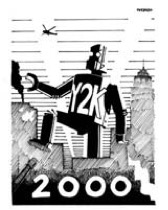
A chapter of Michel Foucault’s famous 1977 Discipline and Punish: The Birth of the Prison (1975, Surveiller et Punir: Naissance de la Prison) is titled “The Carceral.” In a few brief notes, I reconsider the chapter in light of contemporary discussions and literature.
As with so much of Foucault’s work, the chapter starts with a rich, seemingly (but not really) unorthodox example, in this case, the official opening of Mettray, a location where “disciplinary form at its most extreme” was born. Utilizing nearly every form of traditional organizational forms — the family, the army, the workshop, the classroom, and juridical ordering techniques — such that those “young delinquents condemned by the courts” (as well as, I will note, boys charged, but acquitted, and yet were imprisoned as an alternative to “parental correction”) were to be overseen by “technicians of behavior; engineers of conduct, orthopaedists of individuality.”
As you can see from the quotes, Foucault’s language holds nicely to this day, even if post-foucauldians in governmentality studies have “cleaned-up” the ideas so much so that now we rattle-off “voluntary self-regulation through myriad disciplinary techniques,” it is worth remembering that, earlier on, we used to have to learn what Foucault meant from writing that did not give way to bullet-point-like writing or textbook-like bold terms sitting like warts in our prose. That said, some of the prose does not really hold over time as well as his language choices. When I first read Foucault, I recall his work being mind-blowing and yet, at some level, impenetrable. My colleagues would say something like “this is not sociology as usual,” and while I agreed with them back then (perhaps out of fear — Foucault readers often loved him dearly and not “getting it” was something you would not normally want to reveal in public, which I think now Foucault would have laughed about), now that I have some distance from my initial readings, it is easy to see why Foucault was not sociology as usual: it is not sociology. I do not mean it does not belong among the sociology canons; I mean that it was never “just” sociology; his work always struck me as historical, political, social, etc. but that it was simply not possible to reduce it to any of them. At any rate, I return to the retrospective.
Of course, the penal systems were famous for meticulous notes; “a body of knowledge was being constantly built up from the everyday behaviour of the inmates,” such that in the toughest of prisons, at the hardest of times, surveillance always implied: “I shall note the slightest irregularity in your conduct.” These two quotes, juxtaposed in the above sentence, give you also a sense of Foucault that I only notice now. I used to think that he was a dynamic writer, for a historian (I used to think of him this way); however, now, having done some professional writing, I see that Foucault is a master of shifting registers. He switches effortlessly between gigantic abstractions that seem to swallow-up the entire carceral world, for example with a quote like, “a body of knowledge was being constantly built up from the everyday behaviour of the inmates”; however, moments later, he reduces his voice to a nearly personal tone, as if whispering to the reader (without breaking eye contact, I imagine in my mind’s eye) shifts registers to tell you, the reader, what an person might have heard, as a prisoner, and in these moments, you are both, for example, “I shall note the slightest irregularity in your conduct.” You get the feeling Foucault might have, upon uttering this line, paused for effect. As a matter of style, I will take this form of writing over the bullet-points and bolded-terms, but the executive summarizing of texts into carefully constructed abstracts and sound blurbs (like those that post-foucauldian governmentality studies scholars have reduced Foucault to) seem to win the day in our times.
While all the discussion of discipline, training, and then self-discipline is positively lovely to read, I was stopped dead in my book at this line: in a discussion of supervision and being supervised, “[a] subtle, graduated carceral net,” Foucault writes, “with compact institutions, but also separate and diffused methods, assumed responsibility for the arbitrary, widespread, badly integrated confinement of the classical age.” I have no recollection of reading that line before; however, reading it now, its like a curio box of how the work has been up-taken into contemporary sociology: the emphasis on “[a] subtle, graduated carceral net” feels like the precursor for discussions of networked stateness; having the net replete “with compact institutions, but also separate and diffused methods” serves to underscore that Foucault was not an anti-institutionalist, but that institutions were “separate” (or distanced both practically and analytically) from the “diffused methods” upon which much (if not most) discipline is rendered; from there, we get a feel for jurisdiction as a key mechanism for control and knowledge production (which, for example, Andy Abbott’s work is a cool off-shoot as well as Tom Gieryn’s) when we read the net of institutions carefully divorced from the methods of everyday discipline, “assumed responsibility for the arbitrary, widespread, badly integrated confinement of the classical age.” The sentence, as it were, and for me only in retrospect, twinkles like a curio box of Foucault’s lasting legacy.
Another matter warranting some re-consideration is how sloppy Foucault is and how this general sloppiness is neatly pasted-over by his vivid word choices. For example, in an incredibly sloppy historical gloss of the origins of the prison, we get a paint-by-numbers tour of yesteryear, seeing “colonies of poor, abandoned vagrant children,” those boarded-up “almshouses for young female offenders” whose mothers exposed them one too many perversities, backbreaking “penal colonies” for young men often acquitted but condemned to reform through labor, “the institutions for abandoned or indigent children” as well as “orphanages,” what was left of the institution of “apprentices,” or those “factory-convents” where young girls would tally-away under circumstances of voluntary confinement, and if all of those beautiful and tragic pictures of yesteryear were not yet enough to bully the reader into agreeing not to disagree with the fine points raised by Foucault, we now get bombarded by “charitable societies, moral improvement associations, organizations that handed out assistance and also practised surveillance,” and now I am too exhausted to continue this German machine-gun of corollaric examples. Still, a point is to be made here, because we have all seen this technique before (some of us, in our own writing), this “exhaust the reader with colorful examples” technique (I am, myself, routinely guilty of this); however, until reviewing Foucault again for my students in social theory today, I had no idea that I was doing this, as if a scholarly mimeograph machine, in the tradition laid-out by Foucault (although, and it would be fitting, perhaps Foucault was copying somebody else that either I don’t know about or whom has been lost in time).
Those are just a few thoughts, having returned to Foucault’s D&P after a number of years.
<image from: http://bordercriminologies.law.ox.ac.uk/wp-content/uploads/2013/07/copy-cropped-dreamstime_WEB_70689362.jpg>














































You must be logged in to post a comment.